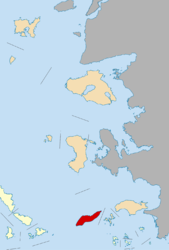Ikaria Island
|
Icaria Ικαρία |
|
|---|---|

View of Agios Kirykos, Ikaria's capital
|
|
| Coordinates: 37°35′N 26°10′E / 37.583°N 26.167°ECoordinates: 37°35′N 26°10′E / 37.583°N 26.167°E | |
| Country | Greece |
| Administrative region | North Aegean |
| Regional unit | Ikaria |
| Area | |
| • Municipality | 255.3 km2 (98.6 sq mi) |
| Highest elevation | 1,037 m (3,402 ft) |
| Lowest elevation | 0 m (0 ft) |
| Population (2011) | |
| • Municipality | 8,423 |
| • Municipality density | 33/km2 (85/sq mi) |
| Time zone | EET (UTC+2) |
| • Summer (DST) | EEST (UTC+3) |
| Postal code | 833 xx |
| Area code(s) | 22750 |
| Vehicle registration | MO |
| Free State of Icaria | ||||||||||
| Ελευθέρα Πολιτεία Ικαρίας | ||||||||||
|
||||||||||
|
Flag
|
||||||||||
|
Anthem Εθνικός ύμνος της Ικαρίας |
||||||||||
| Capital | Icaria | |||||||||
| Languages | Greek | |||||||||
| Religion | Greek Orthodox | |||||||||
| Government | Republic | |||||||||
| President | Ioannis Malahias | |||||||||
| History | ||||||||||
| • | Established | July 18, 1912 | ||||||||
| • | Disestablished | November 1912 | ||||||||
|
||||||||||
Icaria, also spelled Ikaria (Greek: Ικαρία), is a Greek island in the Aegean Sea, 10 nautical miles (19 km) southwest of Samos. According to tradition, it derives its name from Icarus, the son of Daedalus in Greek mythology, who was believed to have fallen into the sea nearby.
Administratively, Icaria forms a separate municipality within the Ikaria regional unit, which is part of the North Aegean region. The principal town of the island and seat of the municipality is Agios Kirykos. The historic capitals of the island include Oenoe and Evdilos.
It is one of the middle islands of the northern Aegean, 255.303 square kilometres (98.573 sq mi) in area with 102 miles (164 kilometres) of coastline and a population of 8,312 inhabitants. The topography is a contrast between verdant slopes and barren steep rocks. The island is mountainous for the most part. It is traversed by the Aetheras range, whose highest summit is 1,037 metres (3,402 feet). Most of its villages are nestled in the plains near the coast, with some in the mountains.
Icaria has a tradition of producing strong red wine. Many parts of the island, especially the ravines, are covered in shrubbery, making the landscape lush with green. Aside from domestic and domesticated species such as goats, there are a number of small wild animals to be found, such as martens, otters, jumping spiders and toads. Icaria exhibits a typical Mediterranean climate.
Icaria has been inhabited since at least 7000 BC, when it was populated by the Neolithic pre-Hellenic race of Pelasgians. Around 750 BC, Greeks from Miletus colonized Icaria, establishing a settlement in the area of present-day Campos, which later became the ancient capital city of Oenoe.
...
Wikipedia



